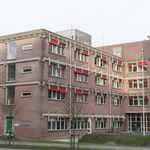General Math Colloquium: Peter Grünwald
E is the New P
- Date
- 1 April 2025
- Time
- 16:00
- Location
- Science Park 107
- Room
- Colloquium room-Nikhef Science Park 105 1098 XG
Abstract
How much evidence do the data give us about one hypothesis versus another? The standard way to measure this is still the p-value, despite a myriad of problems surrounding it. In this talk I will provide a gentle introduction to the e-value (wikipedia), a recently popularized notion of evidence which overcomes some of these issues. E-values, which have a very concrete interpretation in terms of betting strategies, were only given a name as recently as 2019. Since then, interest in them has exploded with Oberwolfach and BIRS workshops and 100s of papers, both theoretical and applied, many in top journals such as the Annals of Statistics. Historically, there are three approaches to testing: the Fisherian approach based on p-values, the Neyman-Pearson approach, which dominates mathematical statistics, based on p-values and ensuing decision making with "Type-I (False Positive) Error Control", and Jeffreys' approach, based on Bayes' theorem. We will show how e-values unify aspects of, and then generalize, all three paradigms. Crucially, they allow for effortless testing under optional continuation of data collection and combination of data from different sources - something that practitioners yearn for, yet is simply impossible to do with the classical approaches. Relatedly, they are the basic building blocks of anytime-valid confidence intervals that remain valid under continuous monitoring and optional stopping.
